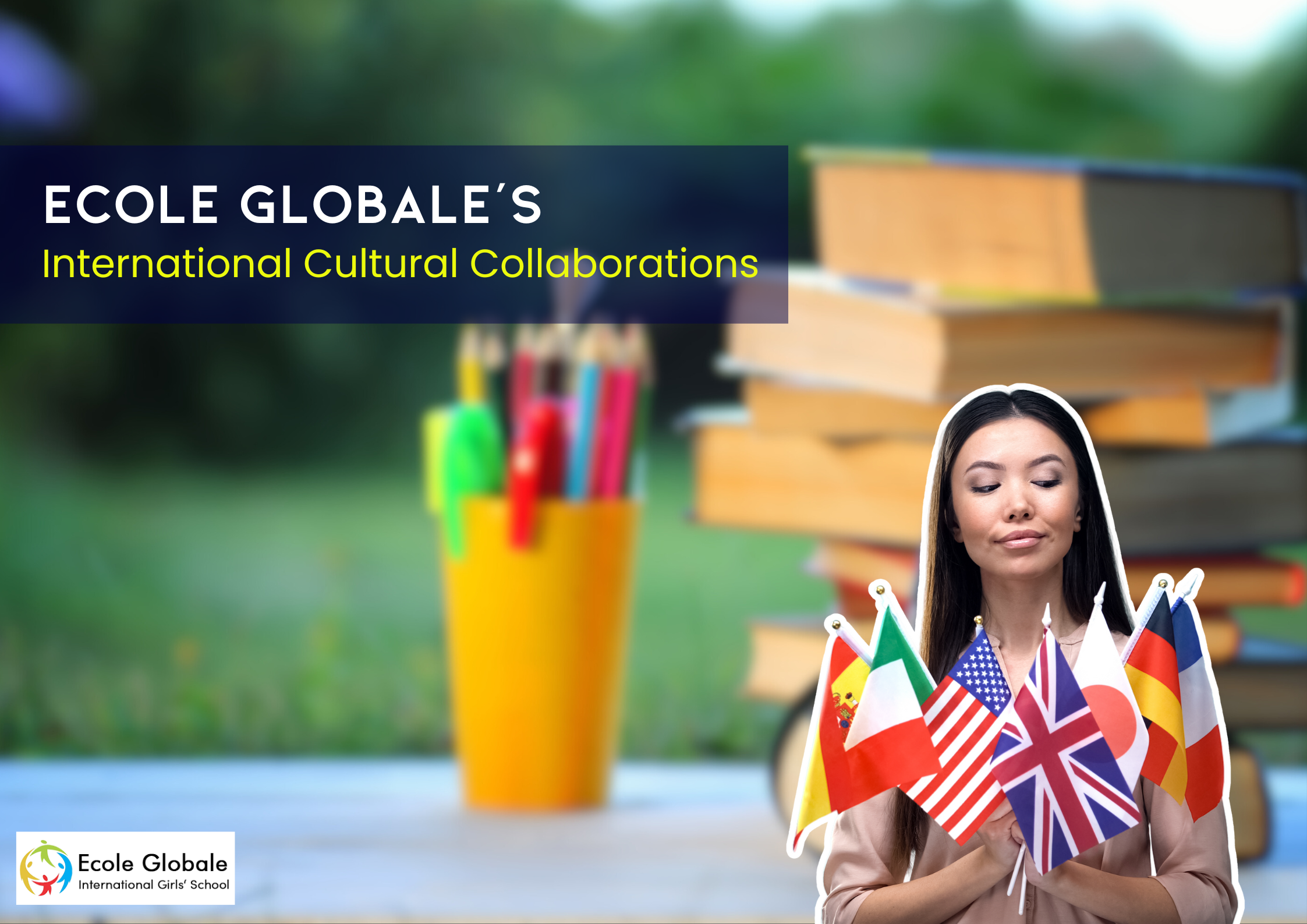International cultural collaborations refer to strategic partnerships and interactions between educational institutions across borders, aiming to foster cross-cultural understanding, promote global citizenship, and enrich the overall educational experience.
These collaborations involve the exchange of ideas, traditions, and perspectives among students and educators from diverse cultural backgrounds.
Importance of cross-cultural interactions in education

The significance of cross-cultural interactions in education cannot be overstated. Exposure to different cultures broadens students’ perspectives, enhances their communication skills, and cultivates a sense of empathy and appreciation for diversity.
In a globalized world, where interconnectedness is paramount, educational institutions play a crucial role in preparing students for a future that requires them to navigate an increasingly diverse and interconnected world.
Ecole Globale’s approach to international cultural collaborations

Ecole Globale, as an educational institution, recognizes the importance of international cultural collaborations in shaping well-rounded, globally aware individuals. With a commitment to providing a holistic education, Ecole Globale has actively pursued initiatives that bring students and educators from different parts of the world together, fostering an environment where cultural exchange is not just encouraged but woven into the fabric of the institution.
Ecole Globale’s Vision and Mission

Ecole Globale’s educational philosophy
Ecole Globale’s educational philosophy centers around the holistic development of students. Beyond academic excellence, the school places a strong emphasis on character building, leadership skills, and a sense of responsibility towards the global community.
This philosophy aligns with the belief that education should go beyond the confines of textbooks, incorporating real-world experiences that prepare students for a dynamic and interconnected future.
Emphasis on global citizenship and cultural diversity
At the core of Ecole Globale’s mission is the cultivation of global citizens. The school recognizes that in an era of globalization, students need to be equipped with not only academic knowledge but also a deep understanding and appreciation for diverse cultures.
By emphasizing cultural diversity, Ecole Globale strives to create an inclusive learning environment that celebrates differences and encourages students to become global ambassadors.
Commitment to fostering cross-cultural understanding
Ecole Globale’s commitment to fostering cross-cultural understanding is reflected in its proactive approach tointernational cultural collaborations. The school believes that meaningful interactions between students of different cultural backgrounds lay the foundation for a more harmonious and interconnected world. Through various programs and initiatives, Ecole Globale seeks to create opportunities for students to engage in cross-cultural dialogue and collaboration.
Past International Collaborations

Highlight key successful collaborations
Ecole Globale has a rich history of successful international collaborations that have contributed to the school’s reputation as a global educational hub. These collaborations have taken various forms, including exchange programs with schools from different countries and joint cultural projects and initiatives.
The success of these endeavors is measured not only by academic achievements but also by the positive impact on the personal and cultural growth of participating students.
Showcase outcomes and impact on students
The outcomes of past international collaborations at Ecole Globale extend beyond academic achievements. Students involved in these programs have reported enhanced interpersonal skills, increased cultural sensitivity, and a broader worldview.
Exposure to different teaching methods, learning environments, and cultural practices has not only enriched their educational experience but has also contributed to their personal development as open-minded and globally aware individuals.
Current Initiatives

Ongoing collaborations with partner institutions
Ecole Globale continues to actively engage in ongoing collaborations with partner institutions around the world. These partnerships are dynamic and multifaceted, encompassing a range of activities designed to promote cultural exchange, collaborative research, and joint artistic or academic ventures. The school believes that by maintaining active partnerships, students can benefit from a sustained and meaningful exposure to global perspectives.
Overview of specific projects or programs
The current initiatives at Ecole Globale include a variety of programs aimed at fostering international cultural collaborations. These initiatives go beyond traditional exchange programs and encompass a spectrum of activities, such as cultural exchange programs, collaborative research initiatives, and joint artistic or academic ventures.
Each program is carefully designed to provide students with a diverse set of experiences that contribute to their overall development.
Cultural exchange programs
Cultural exchange programs involve the exchange of students between Ecole Globale and partner institutions. These programs typically span a semester or academic year, allowing students to immerse themselves in a different cultural setting.
This firsthand experience not only enhances their understanding of global issues but also promotes the development of interpersonal skills and cultural adaptability.
Collaborative research initiatives
Ecole Globale encourages collaborative research initiatives that bring together students and educators from different parts of the world. By working on joint research projects, students gain exposure to diverse perspectives and methodologies, enriching their academic experience. These initiatives often result in the generation of new knowledge and innovative solutions to global challenges.
Joint artistic or academic ventures
Joint artistic or academic ventures involve collaborative projects in areas such as performing arts, visual arts, literature, or academic disciplines. These ventures provide students with a platform to showcase their talents on an international stage, fostering creativity and cross-cultural appreciation. Such initiatives not only contribute to the development of individual skills but also strengthen the bonds between institutions.
Benefits of International Cultural Collaborations

Academic advantages
- Exposure to diverse teaching methods
International cultural collaborations expose students to a variety of teaching methods and educational philosophies. This exposure goes beyond the theoretical aspects of learning, offering students practical insights into different approaches to education. By experiencing diverse teaching styles, students develop adaptability and a broader understanding of academic methodologies.
- Access to a broader range of educational resources
International cultural collaborations with international institutions often provide access to a wider range of educational resources. This includes libraries, laboratories, and expertise that may not be readily available at the home institution. The sharing of resources enhances the overall quality of education and allows students to explore areas of interest in greater depth.
Personal and cultural growth
- Development of intercultural communication skills
Engaging with peers from different cultural backgrounds enhances students’ intercultural communication skills. In a globalized world, effective communication across cultural boundaries is a crucial skill.
Through international cultural collaborations, students learn to navigate cultural nuances, communicate with diverse audiences, and develop the ability to work harmoniously in multicultural settings.
- Enhanced global awareness and empathy
Exposure to different cultures fosters a heightened sense of global awareness and empathy. Students learn to appreciate and respect cultural differences, breaking down stereotypes and prejudices.
This enhanced global awareness is a valuable asset in today’s interconnected world, where individuals are required to navigate a global landscape with sensitivity and understanding.
Challenges and Solutions

Identification of common challenges in international collaborations
While international cultural collaborations offer numerous benefits, they are not without challenges. Common challenges include language barriers, differences in educational systems, and logistical issues related to travel and accommodation. Understanding and addressing these challenges are crucial for the success of collaborative initiatives.
Strategies implemented by Ecole Globale to overcome these challenges
- Communication strategies
Ecole Globale employs effective communication strategies to overcome language barriers and ensure clear understanding between participants.
This includes language immersion programs, language exchange opportunities, and the use of technology to facilitate communication.
- Cultural sensitivity training
To address differences in cultural norms and expectations, Ecole Globale implements cultural sensitivity training for students and educators participating in international cultural collaborations.
This training aims to foster awareness and understanding of cultural nuances, promoting respectful and inclusive interactions.
Future Outlook

Expansion of international collaborations
Ecole Globale envisions a future where international cultural collaborations continue to play a central role in the educational experience of its students.
The school aims to expand its network of partner institutions, diversifying the range of cultural experiences available to students. By fostering new and innovative collaborations, Ecole Globale seeks to remain at the forefront of global education.
Exploration of new opportunities and partnerships
The future outlook involves exploring new opportunities and partnerships that align with Ecole Globale’s mission and values. The school actively seeks international cultural collaborations with institutions that share a commitment to fostering global citizenship, cultural diversity, and academic excellence. Exploring new avenues for collaboration ensures that students have access to a continually evolving and enriching educational experience.
Vision for the long-term impact on students and the school community
Ecole Globale’s long-term vision is centered around the lasting impact international cultural collaborations can have on students and the broader school community.
The school aspires to graduate individuals who are not only academically proficient but also equipped with the skills, perspectives, and values needed to thrive in an interconnected world.
The long-term impact extends beyond the individual student to contribute to a school culture that values diversity, inclusivity, and global awareness.
Conclusion
International cultural collaborations play a vital role in shaping the educational landscape of institutions like Ecole Globale. These collaborations go beyond traditional academic boundaries, providing students with a multifaceted educational experience that prepares them for the challenges and opportunities of a globalized world.
The importance of these collaborations lies in their ability to foster cross-cultural understanding, promote global citizenship, and contribute to the personal and academic growth of students.
Emphasis on Ecole Globale’s commitment to fostering global citizenship
Ecole Globale’s commitment to fostering global citizenship is evident in its proactive approach to international collaborations. The school recognizes that education is not just about acquiring knowledge but also about developing the skills and perspectives needed to navigate an interconnected world.
By actively engaging in international cultural collaborations, Ecole Globale demonstrates its dedication to providing students with a comprehensive education that extends beyond the classroom.
Encouragement for other educational institutions to embrace similar initiatives
As a trailblazer in international cultural collaborations, Ecole Globale encourages other educational institutions to embrace similar initiatives.
The benefits of these collaborations are not limited to academic achievements but extend to the development of well-rounded individuals who are equipped to contribute meaningfully to a globalized society.
By fostering a culture of collaboration and inclusivity, educational institutions can play a pivotal role in shaping a future generation of leaders, thinkers, and global citizens.









